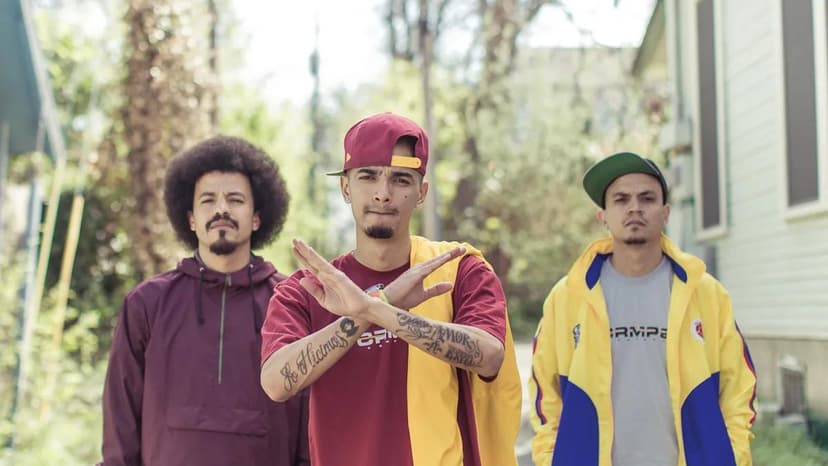Alcolirykoz
Sincerity and street stories have their own soundtrack

You just released a remastered album of your older work. Do you feel that the way of writing and producing has changed from the way it’s done today?
Gambeta:
Yes, at the beginning one realizes where it begins to falter. Before I had plenty of time and now it is what there is least of. How to be more effective in this time when you have a child, family, things to do, one does feel that one has to know how to distribute oneself. Creativity was in that time 24/7 in favor of rap, now you work for this but you have a certain time to sit down and write. What has changed is the way to find those moments and not let ideas escape, not go to bed waiting for everything to come. You have to be very aware because life is changing and it makes you look in other directions.
Kaztro:
In many ways it has been easier for us and in others, as time goes by, it has become more complicated. Gambeta is the one who produces, he already has that musical part at hand and as time goes by, we have found the formula to make the most of the time we have.
What was the biggest challenge at that time when making the album 'En Letras Mayúsculas'?
Gambeta:
At that time it was the economic part. Being focused on one thing that as a profession they saw that you were wasting time and trying not to deviate only by those comments. One's friends in university or work and we with the plan to make a record at a time when rap was supposed to be going nowhere. The important thing was to be decisive and drastic in the decision, we are this. The biggest challenge was the social pressure that is constantly sending you to work for a company, to have money and not to let ourselves be contaminated.
Was there ever a crisis where you were close to giving up on the album, or was the decision always clear?
Kaztro:
We never thought that this wasn't for us. There were difficult moments in our personal lives, things that didn't work out, but we were still very new to the game. We always had in mind, I don't know where it came from, but we said, "Let's do this whether it works out or not."
Fazeta:
What was clear was that we had a lot of work to do. It was the opposite of what people might think. It was something temporary, but we knew we didn't want to stay there. We were clear that this was what we wanted to do, and so far we're still standing there on the line.
Are there any songs that almost didn't make it onto the album?
Gambeta:
At the time, the ones that didn't make it onto the album are the ones we now include. We said there were too many songs, and we didn't know if it was going to be an EP or a demo, as it was called at the time because we needed to have one to know what we were doing. We wanted each of the six songs to have a different color, and then we realized that the two we released ended up being more important than many of the ones that were left out.
Is there a particular story behind "La Típica"? Was it conceived in December?
Gambeta:
It wasn't one of those songs that wasn't premeditated or well-planned from the beginning. The situation made it happen because I made that beat and uploaded it as an exercise to Arkeologo's account, a year before the song came out. It had more likes and comments on Facebook than a video by AZ. I asked what that was all about, and my friends told me that people were amazed and happy that something as traditional as December music sounded so much like rap, because of what we had done.
One day, Julián Gaviria told us, "You should rap something over that," and I still saw it as far-fetched. It was better to leave it alone as a beat that worked. As we approached December 2018, we said, "Let's talk about everything we love about December music, like Rodolfo Aicardi, 'El Loco Quintero,' and we saw that we needed a song that would update Christmas a bit. All those lyrics are 40 years old or more. We need a version of us, of the kids from the neighborhood, of how we experience it now." We did it as an experiment because until it's done, we don't know if we like it or not. As soon as we finished, we said, "This has to come out." That's the story of "La Típica," a song that wasn't so much in the plans but the path starts to show you that it has to be done, and it was a golazo, as we say.
Do you exclude outside influences or do you let other artists direct or inspire you when producing?
Gambeta:
Yes, specifically in 'Fruko y sus Presos' and 'La Típica', which we recorded on the same day, it was the recording session in which the most people participated, there were about 8 people in the studio, engineers rotated to record. That's the cool thing about collective work, when everyone reacts well to something, you can't be wrong. Initially, we were more closed off, not intentionally, but because it was what we had, we worked alone on our own songs. But now that things have grown and we record in larger studios, people come who have a good sense of how things should sound.
How do you work on the lyrics? Is it a collaborative effort or do you write separately?
Gambeta:
The beat always comes first, which is the foundation for us to listen to and see what it suggests. Then there's an initial idea of what to talk about in the song. Each of us writes our parts, but Kaztro and I often get together to improve it until it's ready. It starts with a beat and a need to express something. We explore different themes, what we should talk about, what topics we haven't touched on, what we want to revisit but apply to this time period. We're always jotting down ideas, short phrases, anything, and eventually they end up in the lyrics.
There's a lot of improvisation, a lot of personal experience in Alcolirykoz, that's the nature of rap. If you had to make this album again today, would you do it the same way you did it back then?
Kaztro:
No, things have changed by now, we've changed and the way we work is very different now. If we were to change it, there would be a lot of different things in essence, but the themes, the way of telling those stories would change a bit.
You would take the best and bring it today...
Gambeta:
Sometimes I listen to those songs and then I switch to the newer ones and I think that the personality of the songs has changed, the humor of the songs is different, back then we were that age, more relaxed, now there's a different commitment, seriousness. There are things that, even though we might like them old, we don't want to repeat them like 'Comediantes de Velorio', we're something else now, we'll still play it, but to do it again, no. That's what you can call 'trajectory', taking the albums and seeing how you were in a song.
What's the song that you can't stop listening to from this album?
Gambeta:
It could be 'El Reino de los Suelos' or 'Los Genios de la Botella'
Fazeta:
'Los Genios de la Botella'
In addition, the songs from this album continue to reach every corner.
Other favorite tracks from Alcolirykoz
